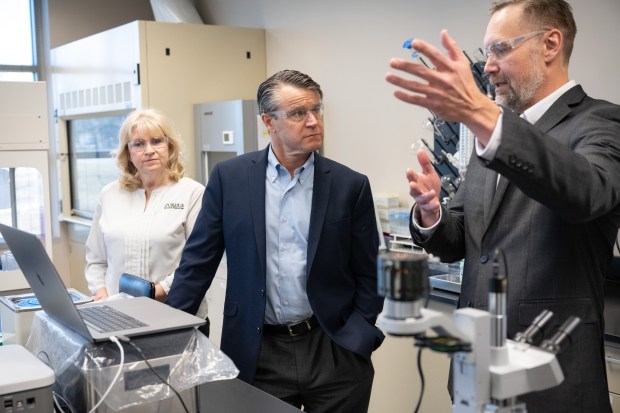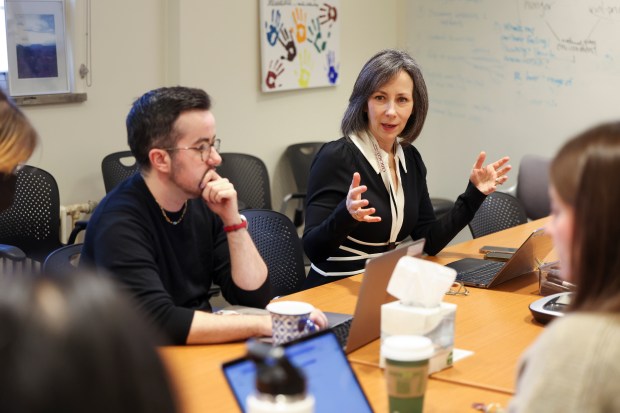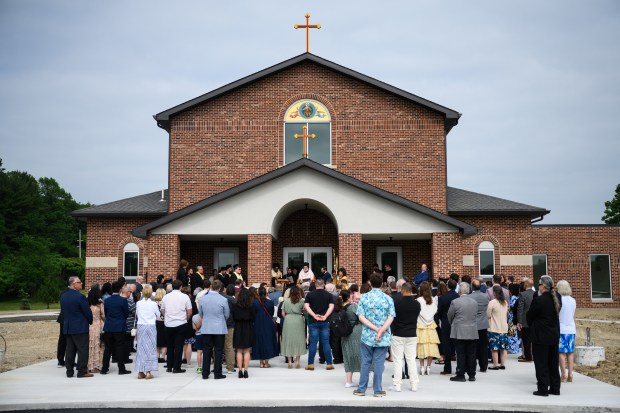Jessica Cantlon’s interest in science began in Northwest Indiana. Her nieces and nephews still live in the region, and she’s worried how changes in federal funding might shape their interests.
“The damage that’s coming down the pipe to science infrastructure in Northwest Indiana might affect how other people are able to access job opportunities and impact the economy and health of people in the region,” said Cantlon, a professor of psychology and neuroscience at Carnegie Mellon University.
In fiscal year 2023, the NIH funded $35 billion in research grants — about $9 billion of which would affected by the cuts
The Trump administration has made drastic cuts to medical research that scientists say will endanger patients and will cost thousands of jobs, according to the Associated Press. Nearly two dozen states sued Monday to block the surprise slashing of billions of dollars, calling it a “devastating” blow. Later Monday, a federal judge in Massachusetts temporarily blocked the cuts from taking effect, setting a hearing for later this month to settle whether they are legal and should proceed. Indiana was not party to the lawsuit, but a subsequent suit by the Association of American Medical Colleges resulted in a nationwide block.
“Every American has benefited from NIH-supported medical research conducted at medical schools, academic health systems, and teaching hospitals nationwide,” the AAMC said in a statement. “Every American will be harmed by the undermining of this long-standing partnership between academic institutions and the federal government.”
President Donald Trump signed an executive order to roll back diversity, equity and inclusion initiatives on Jan. 21, and two days later, the White House called for a funding freeze of federal grants and loans. The freeze was rescinded, and the National Institutes of Health and National Science Foundation began releasing grants.
In a Feb. 7 post on Twitter/X, the NIH announced it was cutting payments toward indirect costs. Indirect costs related to research — from office Wi-Fi and utilities to administrative jobs in a lab — were cut by about 11-13% to a flat rate of 15% starting this week.
NIH support in Indiana has led to more than $1 billion toward economic activity, according to United for Medical Research. NIH awards funding in 2023 reached $414 million statewide and supported 5,359 jobs, according to the website.
United for Medical Research is a national coalition of research institutions, advocates and private industry seeking increases in funding for the NIH, according to its website.
Neurodon, a pharmaceutical startup with offices in Crown Point, received $3 million in 2023 from the NIH to advance its drug for Alzheimer’s Disease, according to its website. The organization could not be reached for comment on funding concerns.

Cantlon expects funding changes will impact Indiana “pretty substantially.”
“A lot of the pipelines that get people into science were just starting to flourish,” the Schererville native said. “When I graduated high school, it was pretty rare for someone to go from these towns into a science career. With each year, it was becoming less and less rare.”
Cantlon is nervous about how state universities will function with funding cuts and said infrastructure for education, health care, jobs and economic benefits will crumble quickly.
Indiana University, Purdue University, the University of Notre Dame and Ball State University are among the state’s top NIH-funded institutions, according to United for Medical Research.
Indiana University School of Medicine researchers received more than $243 million in NIH funding in 2023 — ranking 13th among all public medical schools in the U.S.
Indiana University officials did not respond to multiple requests for comment.
Purdue University officials have been closely tracking the developments around federally supported research, according to an email to Purdue University faculty and staff sent from Executive Vice President for Research Karen Plaut and Chief Financial Officer Chris Ruhl.
“At any given moment, there are bound to be many questions. We do not make changes in policy or practice based on hypothetical directives. And we will forward information, which is agency specific, to the relevant principal investigators whenever we receive it,” according to the email.
The university will continue to support its research, they wrote in the email sent Thursday, which includes long-term strategies like expanding industry partnerships and funding as well as philanthropic fundraising.
“The entirety of your university leadership team is here to help and to support your success. A robust team spanning multiple offices is working continually to provide guidance,” Plaut and Ruhl wrote. “As we navigate the rapidly evolving national landscape, Purdue’s commitment to research excellence and academic leadership remains steadfast.”
Cantlon believes people will almost immediately see the effects of funding cuts, especially at universities that might not have large savings for programs. Other institutions might be able to make it for a few months before they feel the effects, including layoffs, loss of clinical trials and a loss of research studies.
“They might be able to pay people and keep them on, but they’re going to have to let some people go, because they’ll need to stretch that savings as long as they can,” Cantlon said. “Most institutes don’t have savings that could last them more than a year. … Four of five universities in the country might be able to sustain that same level of research that they have now.”
Small campuses and state and public institutions will suffer most from funding cuts because they don’t have large savings accounts. Students will be put at a disadvantage, and research and knowledge will stagnate, Cantlon said.
“People might be able to continue some small fraction of the research they already have going on, but they won’t be able to afford to train anybody new,” Cantlon said. “Certainly they won’t be able to bring in students who are inexperienced and pay for them to learn these techniques, to potentially launch their own creative and scientific work.”
Science funding cuts will start a domino effect past institutional damage, Cantlon said. Public health will be affected because lab equipment might not receive the same funding.
Medical centers rely on the ability to conduct scientific research and train medical students. Without funding, research could decline and so will the ability to recruit and treat patients.
“You can’t schedule them, bring them in for blood draws or checkups, or administer therapies that you planned in your experiment,” Cantlon said. “We’ll be unable to test new treatments, new medicines that could extend the life expectancy of people in the United States.”
Public funding for science is important, Cantlon said, because other scientists can build upon research, and anyone can access it.
If private entities fund research that the NIH previously had, it becomes more difficult to access later.
“That’s something really special about publicly funded science,” Cantlon said. “That’s a reason why funding needs to be preserved and continued. It can’t be replaced by private individuals donating their money to these causes.”





